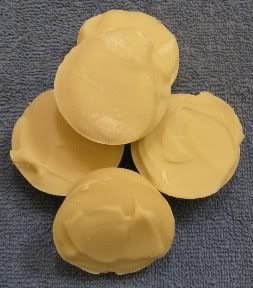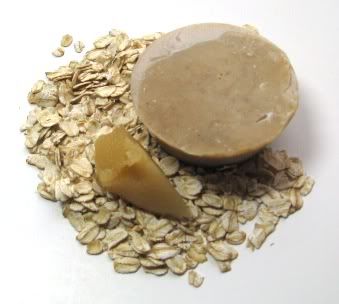
Saturday, January 30, 2010
The Soap Saga
I have sensitive skin. My skin gets dry in the winter. I break out in little spots of exema, especially when I use a soap with irritating dyes, fragrances, and perspectives. My husband gets a headache from strong fragrances. My mother-in-law is even more sensitive than my husband and I put together! I switched to natural or homemade soap about a year ago to reduce our discomfort. After 6 months of buy other people's soap, I thought about making my own. Then I could tweak the ingredients list to our families particular needs. I did instruct students in hot process soap making while I taught high school Chemistry. Early Dec of last year, I made my first batch of cold processed. It was a disaster! But my second batch turned out pretty good. I found that I loved it so much, I had to limit myself to one batch of soap a week!


A few notes on homemade soap...
Types of Homemade Soap
Homemade soap falls into one of three categories: cold processed, hot processed, and rebatched. Cold processed soap is formed by pouring the 'raw' soap into molds. It tends to be smoother in texture than the other kinds of soap and last longer. It also takes longer to cure. When hot processed soap is formed, extra heat is added to the 'raw' soap. The texture is less smooth but the soap takes less time to cure. Rebatched soap is produced when previously made soap is melted down, often to add fragrance or herbs. Rebatching is a great way to add delicate herbs, but it adds additional time to the soap making process.
What is Superfatting?
The process of making soap, called soapfonication, mixes oils with lye and water to create the soap molecule. Sometimes extra oils are added, called superfatting. These extra oils allow the soap to be more moisturizing but they also decrease the lather of the soap and it's shelf life. It also makes the soap softer. Vitamin E can be added to extend the shelf life of the soap and enrich the skin. The extra oils often feel like a 'film' on the skin. They often absorb. A person with dry skin can benefit from a soap that is superfatted. Superfatting is expressed as a percentage; lower percent means less moisturizing oils, higher percent means more moisturizing oils.
Sensitive Skin
People with sensitive skin often benefit from homemade soap. Homemade soap is usually made without the preservatives that cause irritation. For people with very sensitive skin, homemade soap can also be made with dyes and fragrances. The addition of oatmeal and honey into soap also seems to sooth sensitive skin. Children and babies usually do well with unscented soap. Please keep in mind, homemade soap does not contain the numbing agents that are added to commercially available baby soap, so please keep homemade soap out of eyes.
Keep it Dry
Homemade soap can become soft and sticky if it's allowed to sit in water. After using soap, place it on a dry wash cloth or a special soap deck to allow it to dry between uses. This will extend the life of the bar. I put our hand soap on a dry face scrubby to keep it from getting stuck to the counter. Of course, I change the face scrubbie at least once a week to reduce the chance of bacteria growing in the scrubbie.
Antibacterial Properties
Soap, when used properly, has natural antibacterial properties. When you wash your hands, sing the alphabet song while you lather to ensure you've washed long enough to kill germs. Soap makers can add tea tree oil to natural soap to increase it's antibacterial properties. Tea Tree Oil soap is a great alternative to commercially produced antibacterial soap that is often harsh and drying.
Exfoliation
Soap makers will occasionally add exfoliating agents to soap. Cocoa powder, coffee grounds, oatmeal are all natural and gentle ways to remove dead skin. If you suffer from 'chicken skin' or patches of rough skin, try out an exfoliating bar.

Homemade soap falls into one of three categories: cold processed, hot processed, and rebatched. Cold processed soap is formed by pouring the 'raw' soap into molds. It tends to be smoother in texture than the other kinds of soap and last longer. It also takes longer to cure. When hot processed soap is formed, extra heat is added to the 'raw' soap. The texture is less smooth but the soap takes less time to cure. Rebatched soap is produced when previously made soap is melted down, often to add fragrance or herbs. Rebatching is a great way to add delicate herbs, but it adds additional time to the soap making process.
What is Superfatting?
The process of making soap, called soapfonication, mixes oils with lye and water to create the soap molecule. Sometimes extra oils are added, called superfatting. These extra oils allow the soap to be more moisturizing but they also decrease the lather of the soap and it's shelf life. It also makes the soap softer. Vitamin E can be added to extend the shelf life of the soap and enrich the skin. The extra oils often feel like a 'film' on the skin. They often absorb. A person with dry skin can benefit from a soap that is superfatted. Superfatting is expressed as a percentage; lower percent means less moisturizing oils, higher percent means more moisturizing oils.
Sensitive Skin
People with sensitive skin often benefit from homemade soap. Homemade soap is usually made without the preservatives that cause irritation. For people with very sensitive skin, homemade soap can also be made with dyes and fragrances. The addition of oatmeal and honey into soap also seems to sooth sensitive skin. Children and babies usually do well with unscented soap. Please keep in mind, homemade soap does not contain the numbing agents that are added to commercially available baby soap, so please keep homemade soap out of eyes.
Keep it Dry
Homemade soap can become soft and sticky if it's allowed to sit in water. After using soap, place it on a dry wash cloth or a special soap deck to allow it to dry between uses. This will extend the life of the bar. I put our hand soap on a dry face scrubby to keep it from getting stuck to the counter. Of course, I change the face scrubbie at least once a week to reduce the chance of bacteria growing in the scrubbie.
Antibacterial Properties
Soap, when used properly, has natural antibacterial properties. When you wash your hands, sing the alphabet song while you lather to ensure you've washed long enough to kill germs. Soap makers can add tea tree oil to natural soap to increase it's antibacterial properties. Tea Tree Oil soap is a great alternative to commercially produced antibacterial soap that is often harsh and drying.
Exfoliation
Soap makers will occasionally add exfoliating agents to soap. Cocoa powder, coffee grounds, oatmeal are all natural and gentle ways to remove dead skin. If you suffer from 'chicken skin' or patches of rough skin, try out an exfoliating bar.

Wednesday, January 13, 2010
10 Great things about Vince that we are really going to miss
1) Vince had a great Italian-Brooklyn accent. We enjoyed listening to the way he talked.
2) Vince was a great chief. We loved the foods he prepared and also the cuisine he introduced us to at restaurants.
3) We appreciated Vince’s direct, no-nonsense communication style.
4) We really respect Vince’s intellectual prowess. He was smart and a life-long learner.
5) Vince always had the coolest gadgets. He embraced change in technology.
6) Vince was a self-made man. He perused his interests without allowing others to dictate how he should live his life.
7) Vince was motivated to pursue his interests. Hard work did not deter him.
8) Vince had a great sense of humor.
9) Vince encouraged us to follow our dreams.
10) Vince was a wonderful friend and companion to my Grandma.

2) Vince was a great chief. We loved the foods he prepared and also the cuisine he introduced us to at restaurants.
3) We appreciated Vince’s direct, no-nonsense communication style.
4) We really respect Vince’s intellectual prowess. He was smart and a life-long learner.
5) Vince always had the coolest gadgets. He embraced change in technology.
6) Vince was a self-made man. He perused his interests without allowing others to dictate how he should live his life.
7) Vince was motivated to pursue his interests. Hard work did not deter him.
8) Vince had a great sense of humor.
9) Vince encouraged us to follow our dreams.
10) Vince was a wonderful friend and companion to my Grandma.

Subscribe to:
Comments (Atom)
